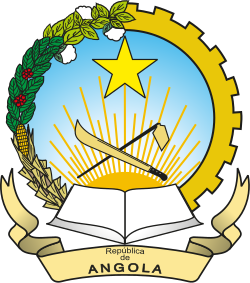Electoral history
Although Angola had sent representatives to the Portuguese Parliament in the early 19th century, it was not until the 1920s that the Portuguese authorities consented to the creation of a legislative body in the territory. In 1922 a Legislative Council was established, elected by Portuguese settlers. [1] However, the council was suppressed following the 1926 coup in Portugal.
In 1955 a new Legislative Council was established, although only those officially classed as "civilised" were allowed to vote. This effectively limited the franchise to European settlers, most mulattos and a small number of Europeanised Africans ( Assimilados ). [2] In May 1972 the Portuguese parliament passed the Organic Law for the Overseas Territories, which provided for greater autonomy for overseas territories; this created a 53-member Legislative Assembly for Angola, of which 32 would be elected, with the remainder nominated by public services, religious groups and business groups. [3] Elections were held in March 1973, but due to continued restrictions on suffrage, only 584,000 people registered to vote out of a total population of 5,673,046. Around 86% of those registered cast votes, and the elected members included 29 Europeans and 24 Africans. [3]
Following independence in 1975, the outbreak of the Angolan Civil War delayed the country's first post-independence elections until 1980. By then, the MPLA had created a one-party state. It organised indirect elections, in which voters elected carefully vetted candidates to electoral colleges, who in turn elected the National Assembly. [4] The next elections were due to be held in 1983, but they were delayed until 1986 due to the ongoing war. [5] When they were held, it was under the same indirect system.
The Bicesse Accords ended the civil war in 1991 and saw the introduction of multi-party democracy. General elections were held in 1992, with the President being elected by the public for the first time. The MPLA won 129 of the 220 seats in the National Assembly, whilst UNITA emerged as the main opposition party with 70 seats. José Eduardo dos Santos of the MPLA and Jonas Savimbi of UNITA received the most votes in the first round of the presidential elections, but Savimbi claimed the election had been rigged, despite United Nations observers stating that they had been mostly free and fair. [6] He refused to participate in the runoff, and restarted the civil war.
The civil war ended in 2002 following Savimbi's death. However, elections were delayed until 2008. The MPLA received over 80% of the vote, winning 191 of the 220 seats in the National Assembly. Presidential elections were scheduled for 2009, [7] but a new constitution promulgated in 2010 scrapped direct elections for the presidency, with the leader of the largest party in the National Assembly automatically becoming president. The next elections in 2012 saw another landslide victory for the MPLA, although their vote share was reduced to 72% and they lost 16 seats.
This page is based on this
Wikipedia article Text is available under the
CC BY-SA 4.0 license; additional terms may apply.
Images, videos and audio are available under their respective licenses.

